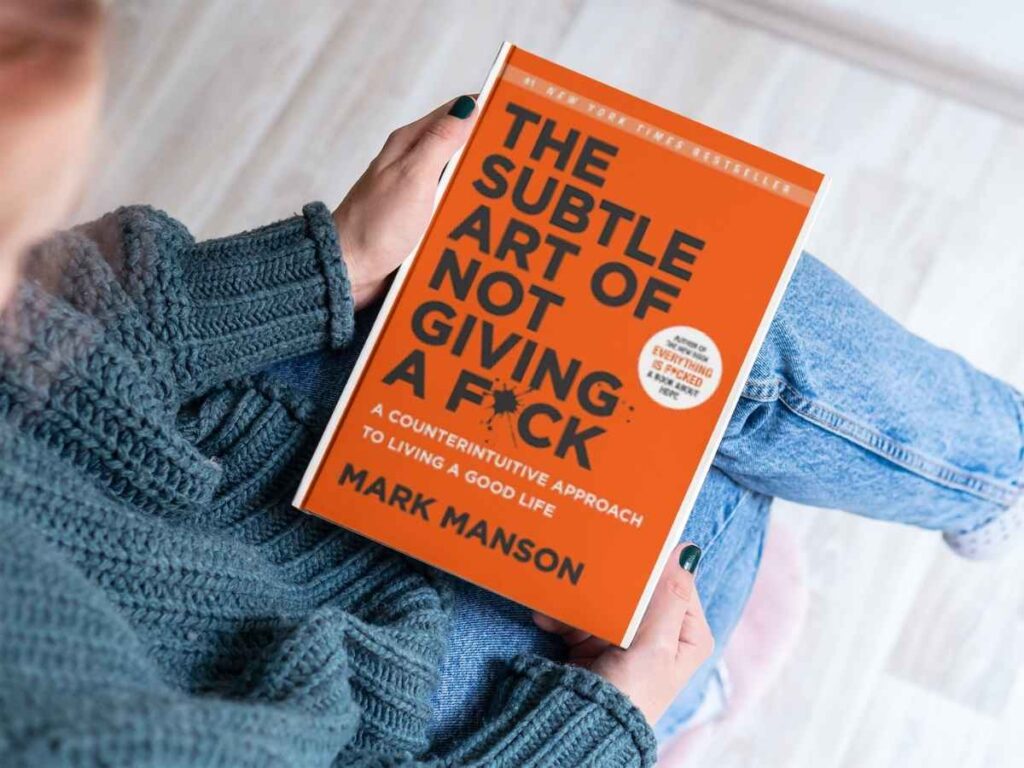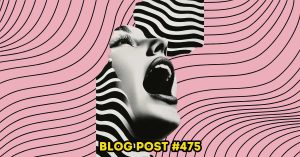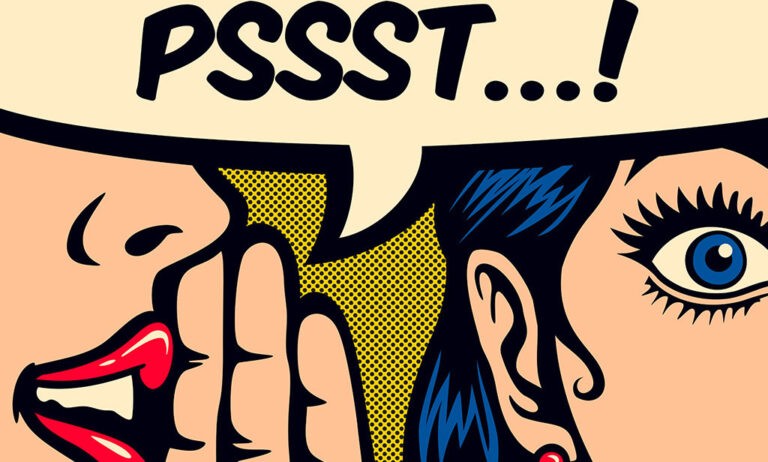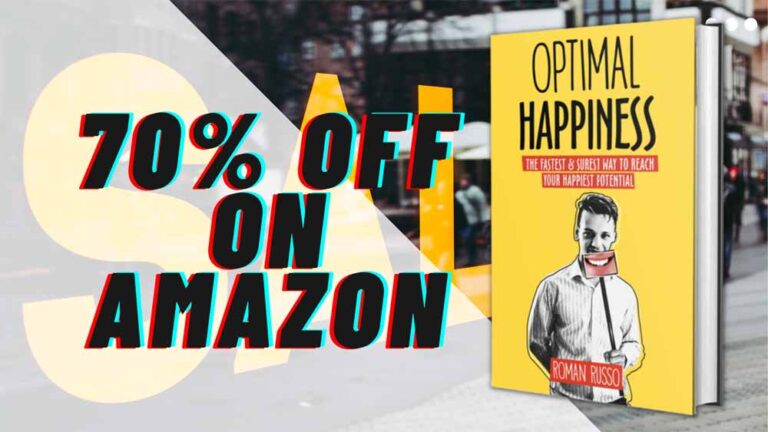
Sorry (not sorry), but despite everything you may have heard about The Subtle Art of Not Giving a F*ck by Mark Manson, it is a bad and harmful book that no one should read, especially if you care about your happiness.
Sure, this book has very good reviews on Amazon, Audible, and other platforms and has been a #1 New York Times Bestseller for many years. It is well-written in terms of storytelling and has a catchy title. After all, who doesn’t want to “give less F’s?”
However, beneath its presentation, Mark Manson is a pessimist and this book promotes negativity and unhappiness. It advises that if you are already negative, good, continue to be so, and if you are positive, you are probably delusional, so instead you should just be unhappy. It is therefore harmful, especially because it is so popular, and from the perspective of happiness coaching, I am morally opposed to this book.
It saddens me to see so many people reading this book thinking that they are going to change their lives for the better, learning to give less F’s, while in reality they are doing the opposite. The Subtle Art of Not Giving a F*ck is a prime example of the fact that just because a book, business, person, or anything else is popular doesn’t mean it is good for you.
Today, I want to provide my unbiased opinion and explain exactly why I think this book is harmful and why it shouldn’t be read, written from a perspective of happiness coaching. Hopefully, this will prevent some people from going down a destructive path or undo some harm already done by this book.
Sweet Poison Is Still a Poison
When I first saw The Subtle Art of Not Giving a F*ck, I was intrigued. I also wanted to learn to give fewer F’s and I didn’t have any prior ideas that this book was bad or that it should be avoided. After all, if a book is so popular, there must be a good reason for it, right?
However, the more I read, the more a sense of doubt crept into my bones as something seemed seriously wrong with Mark Manson’s arguments, until it hit me. He is just a pessimist and he is promoting negativity in a way that makes it sound fun. He states that happiness is an illusion of the masses, something made up and unattainable, at least not in any durable and long-lasting way anyway, and that it is completely reasonable and even encouraged to feel bad about yourself.
Certainly, I don’t want you to take my word for it. To prove my point, I randomly reopened his book to collect a few easy-to-spot examples that are abundantly available. For example:
In Chapter 3, titled “You Are Not Special,” Mark Manson makes fun of Jimmy, who he believes is a victim of the high positive self-esteem movement. Manson states that:
“Merely feeling good about yourself doesn’t really mean anything unless you have a good reason to feel good about it” and that “teaching people to believe they’re exceptional and to feel good about themselves no matter what doesn’t lead to a population full of Bill Gates and Martin Luther Kings. It leads to a population full of Jimmys.”
Instead
“It turns out that adversity and failure are actually useful and even necessary for developing strong minded and successful adults.”
In essence, Mark Manson argues that positivity is toxic and even dangerous, while embracing negativity will actually lead to success, which leaves me wondering why we desire success in the first place if it is not to enjoy happy feelings that come with being successful.
Furthermore, in Chapter 2, titled “Happiness in a Problem,” Mark Manson shares his take on the story of Buddha, whom he describes as being “all emo about everything and complained a lot” proceeding to “sleeping in dirt like an animal,” “for years lived like a bum, a discarded and forgotten remnant of society, the dog shit cakes to the bottom of the social totem pole.”
This short passage is offensive on so many levels, and if you’re not familiar with Buddha or Buddhism, just try replacing “Buddha” with Jesus, Krishna, Lao Tzu, or other figures from your own religion and see how it feels.
As such, according to Mark Manson, “happiness is not a solvable equation” (which is incorrect – just read Optimal Happiness) and “dissatisfaction and unease are inherent parts of human nature.” But somehow they are also “necessary components of creating consistent happiness” (anyone else hears a contradiction here?). Manson also says “F*ck happiness” but then later suggests that “if you really want to be happy then do X.” So which is it? Do you want to be happy or not?
Furthermore, here are a few other titles and subtitles from The Subtle Art of Not Giving a F*ck:
– “The Value of Suffering”
– “Shitty Values”
– “You Are Wrong About Everything”
– “Kill Yourself”
– “Pain Is Part of the Process”
– “The Sunny Side of Death”
– “And Then You Die”
Overall, I could write much more about Mark Manson and his negative worldview, but then I would have to write The Subtle Art of Not Giving a F*ck.
Stop Swearing if You Want to Feel Happy
Also, Mark Manson excessively curses throughout his book, even managing to include F*ck in the title. This may sound cool at first, until we realize that it is just a reflection of his consistent negativity, which we will soon become familiar with while reading his book.
Sure, some occasional and rare cursing is acceptable, especially if used in a comedic or assertive manner. However, when it is done excessively, it is a sign of negative thinking. This combined with his overall negatively framed advice gives me a clear impression that Mark Manson is a pessimist and slave to negative thinking.
Happiness vs. Unhappiness

I am an avid reader, particularly of books about happiness and unhappiness. I believe that in order to effectively defend my position that Optimal Happiness is possible for everyone, regardless of who we are, where we are from, and our life circumstances. I need to understand the opposing point of view almost as well as my own. This allows me to make an informed choice between which is better: happiness or unhappiness. Consequently, this is how I know that The Subtle Art of Not Giving a F*ck is a prime example of a book that promotes unhappiness and negative thinking and, therefore, should be avoided.
However, how do we know for certain that happiness is truly superior to unhappiness? The answer can be found in science, which provides overwhelming evidence supporting the superiority of happiness over unhappiness. Happier people tend to be more productive, healthier, wealthier, have better relationships, and exhibit more altruistic behavior. Additionally, they enjoy their lives more and are generally considered to be better human beings overall.
This is why I always say that anyone who promotes unhappiness should be avoided as much as possible. They have the power to destroy our happiness, well-being, and overall human potential. By listening to them, we lose all of the benefits mentioned above and replace them with their opposites.
In turn, when people feel negative they often seek support, making a metaphorical cry for help, asking others to fix their problems, issues, and overall negativity. However, when they don’t find a solution to their pain, they try to justify it by stating that happiness is bad, impossible to achieve, and that we should give up and embrace unhappiness.
However, happiness is still possible, and the first step is to stop listening to people like Mark Manson and instead replace their negatively framed advice with some positivity, such as by attending one of the Optimal Happiness courses.
Other Books by Mark Manson
In his latest book, Everything Is F*cked: A Book About Hope, Mark Manson delivers another dose of toxic negativity. It seems like there isn’t much more to say about it, considering the all criticisms already made about his previous book, The Subtle Art of Not Giving a F*ck.
Furthermore, Mark Manson tells a story about his first girlfriend cheating on him, which was completely devastating. This experience led him to fire back at women becoming ladies man, breaking the hearts of hundreds of women in retaliation, and even writing a book called Models: Attract Women Through Honesty, teaching other men how to do the same.
And while learning how to have good relationships is actually something positive, we just need to understand the man behind this advice. That book teaches men how to get women into bed first. Sure, this can ultimately teach men how to have good relationships and become a better human being.
However, if we follow Mark Manson’s advice, we first inherit Mark Manson’s pessimism and his costly mistakes. The biggest mistake being that sleeping around actually damages one of the most important relationships with your life partner. This is because people become overstimulated by many partners, becoming picky, unable to commit and stay committed, which in turn leads to breakups, broken hearts, divorces, broken families, children being raised without both parents, low self-esteem, etc.
In other words, the best way to have a successful relationship is to start off on the right foot. This can be challenging when so many people are influenced by the likes of Mark Manson, rather than receiving guidance on building healthy relationships, such as from someone like Mark Gungor, who is my preferred relationship expert.
The Subtle Art of Not Following Mark Manson’s Advice
Overall, if I learned anything from this book it is what not to do. It pushed me to think through Mark Manson’s arguments without blindly accepting them as fact. And while some stories may seem like “good advice” simply because they are well-written, we cannot take The Subtle Art of Not Giving a F*ck at face value as ultimately it promotes negativity and therefore it is toxic.
I don’t feel bad sharing that I don’t like this book, even as a happiness coach. In life, we need to learn not only what we should do, but also what we shouldn’t do. Furthermore, we should understand why certain actions are not beneficial. In case of The Subtle Art of Not Giving a F*ck its popularity does not equate to its goodness, and in fact, it just reminds us that something popular can be harmful.
Instead, if your true goal is happiness and you want to give less F’s in a healthy way from a perspective of happiness and improving your life, I recommend reading the book Optimal Happiness or trying our coaching webinars.
Oh God! They actually made a movie about this? It seems like it’s going to be just as horrible as his book. Now you can experience the negativity through watching this movie. Fantastic! I suppose the same advice goes for this movie, his blog, his other books, and anything connected to Mark Manson. Stay away from it all if you care about your happiness!
Stay happy, ignore Mark Manson, and create a happy and fulfilling life for yourself!















1 thought on “DON’T Buy The Subtle Art of Not Giving a F*ck by Mark Manson”
Pingback: Barbie: Is It Empowering or Depressing for Both Genders?